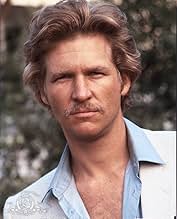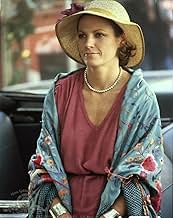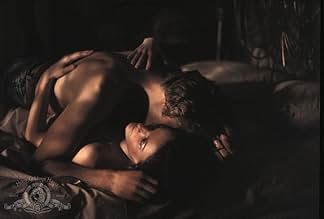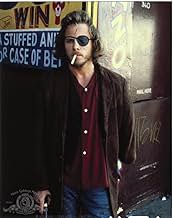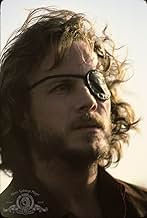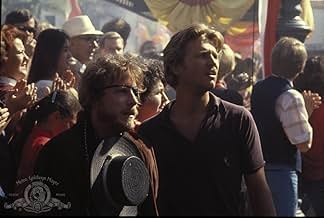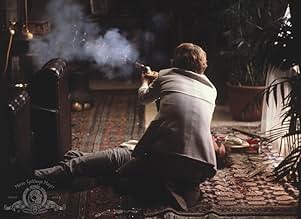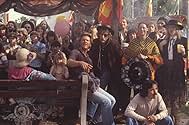AVALIAÇÃO DA IMDb
6,8/10
7,9 mil
SUA AVALIAÇÃO
Richard vê um homem descarregando um corpo e decide expor o homem que ele pensa ser o culpado com seu amigo Alex Cutter.Richard vê um homem descarregando um corpo e decide expor o homem que ele pensa ser o culpado com seu amigo Alex Cutter.Richard vê um homem descarregando um corpo e decide expor o homem que ele pensa ser o culpado com seu amigo Alex Cutter.
- Prêmios
- 2 vitórias e 2 indicações no total
Francis X. McCarthy
- Toyota Man
- (as Frank McCarthy)
- Direção
- Roteiristas
- Elenco e equipe completos
- Produção, bilheteria e muito mais no IMDbPro
Enredo
Você sabia?
- CuriosidadesBefore production started on this film, Ivan Passer and producer Paul R. Gurian went to Jeff Bridges' house to ask him if he would agree to play Bone. After both entered Bridges' property, the actor's dog, a big German shepherd, attacked Gurian, biting him on the jaw. Gurian nearly died. Bridges later confessed that, after this incident, he had no choice but to accept the role in order to avoid being sued for several million dollars.
- Erros de gravaçãoValerie's disappearance is neither explained nor noted by the main characters.
- Citações
Alex Cutter: I don't drink. You know, the routine grind drives me to drink. Tragedy, I take straight.
Avaliação em destaque
The title "Cutter's Way" is a reference to the main character, Alexander Cutter, perhaps cinema's all-time best antihero. John Heard plays the difficult role of an angry Vietnam veteran who returned from what he now regards as a meaningless war minus an arm, an eye, and a leg. He hates the fat cats-feeling that they conned him and others into patriotically serving while they stayed home, and he resents his best friend Richard Bone (Jeff Bridges) who avoided the war and continues to avoid any involvement or commitment. Commitment is Alexander Cutter's one remaining virtue, when he sets his sights on taking down an arrogant oil tycoon who has gotten away with murdering a 17 year old cheerleader, he stubbornly refuses to give up this mission and insists on doing it his way.
Heard should have gotten the Best Actor Oscar in 1981 (it went to Henry Fonda for "On Golden Pond") but "Cutter's Way" was not popular with critics and viewers so Heard was not even nominated. It is an amazing performance as Heard must win audience sympathy for a character who is not only unpleasant, but terribly abusive to everyone- especially his wife and his only two remaining friends. But he earns our admiration with his final act as a knight (on a white horse) who gallops into danger to avenge his wife's murder.
With this Cutter is finally revealed as a romantic who is willing to back up his angry words and seemingly empty threats. His anger is over more than his wasted wartime sacrifice. He feels frustration and confusion because while he has remained the same, the world has changed around him in ways antithetical to his beliefs (can you identify with that?). He recognizes that he has become irrelevant to this world but is not going out until he has made a last stand. His commitment ultimately gets Bone to take his first moral stand and finish what his friend started, doing it "Cutter's Way".
Like "Fat City" (another of Jeff Bridges' early films) "Cutter's Way" is more appreciated now than at the time of its release. In part this is because both of these films have held up very well, if anything their political messages are even more relevant today. Thematically "Cutter's Way" is a political film-both anti-war and anti-power; very much in the tradition of "Chinatown" and the world of Raymond Chandler adaptations.
This film is essentially a character study with an expressionistic ending. Most action/adventure fans will find it way too slow and cerebral for their tastes. The acting and the themes are its strength, the contrived story is a non-fatal flaw. The multi-dimensionality of Cutter, Bone, and Cutter's wife Mo (an extraordinary performance by Lisa Eichhorn) are carefully crafted and revealed by director Ivan Passer. Cutter's other remaining friend George (Arthur Rosenberg) is equally well crafted but more secondary to the story.
A fifth character (the dead cheerleader's older sister played by Ann Dusenberry) appears to be a victim of the post-production process as she simply disappears without explanation about 20 minutes before the film's end. Normally the absence of a supporting character would go unnoticed but Dusenberry had done such a nice job developing this character (maximizing what little she was given to work with) that the absence is glaring. Contemporary audiences will see a lot of Dominique Swain in Dusenberry. They not only look enough alike to be sisters but they have the same confident flare to their acting style. Passer had to work hard to keep Dusenberry reined in but succeeded in getting a nice restrained performance from her, her high intensity peeks through just enough to convey that there is more to her character than meets the eye.
Then again, what do I know? I'm only a child.
Heard should have gotten the Best Actor Oscar in 1981 (it went to Henry Fonda for "On Golden Pond") but "Cutter's Way" was not popular with critics and viewers so Heard was not even nominated. It is an amazing performance as Heard must win audience sympathy for a character who is not only unpleasant, but terribly abusive to everyone- especially his wife and his only two remaining friends. But he earns our admiration with his final act as a knight (on a white horse) who gallops into danger to avenge his wife's murder.
With this Cutter is finally revealed as a romantic who is willing to back up his angry words and seemingly empty threats. His anger is over more than his wasted wartime sacrifice. He feels frustration and confusion because while he has remained the same, the world has changed around him in ways antithetical to his beliefs (can you identify with that?). He recognizes that he has become irrelevant to this world but is not going out until he has made a last stand. His commitment ultimately gets Bone to take his first moral stand and finish what his friend started, doing it "Cutter's Way".
Like "Fat City" (another of Jeff Bridges' early films) "Cutter's Way" is more appreciated now than at the time of its release. In part this is because both of these films have held up very well, if anything their political messages are even more relevant today. Thematically "Cutter's Way" is a political film-both anti-war and anti-power; very much in the tradition of "Chinatown" and the world of Raymond Chandler adaptations.
This film is essentially a character study with an expressionistic ending. Most action/adventure fans will find it way too slow and cerebral for their tastes. The acting and the themes are its strength, the contrived story is a non-fatal flaw. The multi-dimensionality of Cutter, Bone, and Cutter's wife Mo (an extraordinary performance by Lisa Eichhorn) are carefully crafted and revealed by director Ivan Passer. Cutter's other remaining friend George (Arthur Rosenberg) is equally well crafted but more secondary to the story.
A fifth character (the dead cheerleader's older sister played by Ann Dusenberry) appears to be a victim of the post-production process as she simply disappears without explanation about 20 minutes before the film's end. Normally the absence of a supporting character would go unnoticed but Dusenberry had done such a nice job developing this character (maximizing what little she was given to work with) that the absence is glaring. Contemporary audiences will see a lot of Dominique Swain in Dusenberry. They not only look enough alike to be sisters but they have the same confident flare to their acting style. Passer had to work hard to keep Dusenberry reined in but succeeded in getting a nice restrained performance from her, her high intensity peeks through just enough to convey that there is more to her character than meets the eye.
Then again, what do I know? I'm only a child.
- aimless-46
- 2 de nov. de 2005
- Link permanente
Principais escolhas
Faça login para avaliar e ver a lista de recomendações personalizadas
- How long is Cutter's Way?Fornecido pela Alexa
Detalhes
- Data de lançamento
- País de origem
- Idiomas
- Também conhecido como
- Obstinação
- Locações de filme
- 800 Alvarado Place, Santa Barbara, Califórnia, EUA(El Encanto Hotel scenes.)
- Empresa de produção
- Consulte mais créditos da empresa na IMDbPro
Bilheteria
- Orçamento
- US$ 3.000.000 (estimativa)
- Faturamento bruto nos EUA e Canadá
- US$ 1.729.274
- Faturamento bruto mundial
- US$ 1.752.634
Contribua para esta página
Sugerir uma alteração ou adicionar conteúdo ausente

Principal brecha
By what name was Caso de Assassinato (1981) officially released in India in English?
Responda

